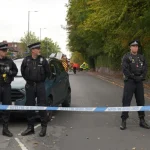

Jewish students are “under siege” on campus, and a poll released Monday revealed that the various anti-Israel efforts pushed in higher education nationwide have made the Jewish community feel increasingly unsafe.
Seventy-three percent of Jewish students reported feeling less safe on campus after the Oct. 7 attack, and it is not the fear of an attack on American soil that scares them but the increasingly hostile environment campuses have become for Jewish students as anti-Israel initiatives gain momentum.
“Since Oct. 7, Jewish students on campus are facing a disturbing escalation of physical attacks, harassment, and antisemitism, including a sharp rise in BDS campaigns,” CEO of the Israel on Campus Coalition Jacob Baime told the Washington Examiner. “Despite these challenges, Jewish students have shown remarkable resilience.”
In 2021, a poll found that 65% of students in the leading Jewish fraternity and sorority felt unsafe on campus, with 50% going as far as hiding their Jewish identity out of fear. Following the terrorist attack on Oct. 7, 2023, the ADL reported a 400% uptick in antisemitic incidents, contributing to this increased feeling of unsafety.
“There have been a lot of anti-Israel protests, there have been a lot of antisemitic demonstrations and efforts, but the BDS movement is one that has really been widespread as it’s reaching college campuses,” Carly Cooperman, CEO and pollster at Shoen Cooperman Research told the Washington Examiner in an interview.
The poll was conducted by Cooperman and SCR founder Douglas Shoen in partnership with the Israel on Campus Coalition and found that the boycott, divest, and sanction movement is largely to blame for facilitating an “unsafe” atmosphere for Jewish students.
The poll found that 77% of Jewish college students believe the BDS movement is antisemitic or has antisemitic supporters and that 65% believe it poses a real threat to Jewish students.
“Generally, there’s more of a lack of knowledge among college students about BDS,” Cooperman said. “And then, once [students] gain information about BDS, it quickly turns people to also acknowledge the antisemitic sentiments, too.”
The poll found that Jewish students feel it is “critical” to take a stand against BDS initiatives on campus, with 81% expressing the importance of using one’s own voice to stand with the Jewish community.
“Jewish students don’t necessarily feel comfortable taking a stand,” Cooperman said. “They almost rather just lay low, and I understand that argument as it relates to safety, but I think there is an interest in standing up for Judaism, for the right to be Jewish.”
Cooperman, alongside Shoen, expressed the need for non-Jewish students to take a stand against anti-Israel initiatives in the wake of this “alarming” poll in an op-ed for the Hill in which they described the current status of the Jewish community on campus as being “under siege.”
She told the Washington Examiner that non-Jewish students must “continue the fight and the efforts that are being made to counter the resolutions that BDS is trying to pass on campus.”
The poll additionally looked at how college students in general feel about Israel and BDS, finding a stark contrast between the sentiment of college students and the average person.
As universities, along with their faculty and students, have become more left-liberal, the dichotomy often used by those on the left of “oppressor and oppressed” is being inappropriately used to characterize Israel’s role in the conflict with Hamas, Cooperman argued.
“They’ve made this entire thing about oppression of civilians, despite the fact that Hamas literally uses civilians as shields,” she said. “It’s [Hamas’s] goal to make Israel look bad by making them kill people in order to get to [the point] that no one’s paying attention to the actual terrorist attack that took place.”
“The perspectives of young people are so different and really lack a lot of historical context of the evolution of Israel. So I’m not saying it’s realistic that there can be a countereducation effort, but I think we’ve got to try to give people information beyond trying to fight these [BDS] resolutions,” Cooperman continued.
The Washington Examiner spoke with Kenneth Marcus, founder and head of the Brandeis Center, to shed light on the campus culture that has prompted his organization to launch a number of civil rights lawsuits.
“Universities need to be both reactive and proactive. They need to respond to antisemitism with the same seriousness that they display when addressing other forms of discrimination. This means dismantling the two-tiered system under which microaggressions against other groups are fiercely resisted while even macroaggressions against Jewish students are minimized,” he said.
Marcus, who served as assistant secretary of education for civil rights in the Trump administration, explained that a “serious response” would require looking at the “deep cultural rot” on campus and identified a number of programs sold as fostering inclusivity but instead result in only furthering the problem.
“University leaders need to ask how it is that our finest institutions are turning out a generation of students who so easily succumb to the vilest forms of prejudice. This means taking a hard look at the whole constellation of programs that are supposed to make colleges better and instead are making them worse: everything from DEI to anti-racist programming to critical race theory to liberated ethnic studies to post-Colonial curricula to the whole identity-industrial complex,” he said.
“This problem will not just blow over,” Marcus warned. “It may even get worse before it gets better. What we know from our experience with campus antisemitism over recent decades is that spiking campus turmoil may last from weeks to months, and it may even last for years.”
Unsurprised by the results of Monday’s poll, Marcus said, “The fact is that all Jewish students are now less safe. While the media focus on rampant hate speech, what we’re seeing is not just speech but also assault, intimidation, and vandalism.”
CLICK HERE TO READ MORE FROM THE WASHINGTON EXAMINER
“There’s some degree where it’s being [sold] as ‘This is free speech. This is pro-Palestinian. This is supporting the people in Gaza,’” Cooperman explained.
“Imagine if 81% of students from any other group felt targeted and unwelcome on campus. For Jewish students, that’s the disturbing reality due to BDS votes,” Baime said. “BDS is not about free speech. It’s about free hate. It’s time for university leaders to step in and cancel these votes.”






